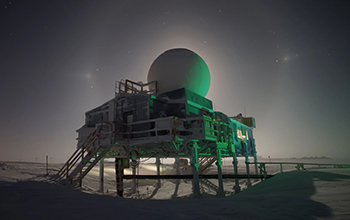NSF invites professional news media to report from Summit Station, Greenland
April 3, 2023
The U.S. National Science Foundation (NSF), as part of the NSF Polar Media Program, is accepting proposals for media to visit Greenland to report on research supported by NSF’s Office of Polar Programs (OPP).
Those selected will visit Summit Station, Greenland, in late May 2023. Summit Station is an NSF-funded research hub supporting a wide range of scientific research year-round. Fields of study include meteorology, glaciology, atmospheric chemistry and astrophysics. Summit Station is also the site of a Long Term Observatory (LTO) program that collects data on key baseline variables of climate change. Media will have the opportunity to interview research teams residing and working on station. Current science projects are listed on the Summit Station website.
The purpose of the NSF Polar Media Program is to raise awareness of the United States' scientific and operational activities in the Arctic region, Antarctica and the Southern Ocean. NSF will select the outlet whose reporting will have the farthest reach in increasing public awareness about NSF-supported scientific research being conducted at Summit Station. Competitive proposals should contain some of the following attributes:
- Detail how your work will provide a new or greater understanding of the Arctic region, science and/or operations.
- A documented ability to reach the broadest possible audience across various platforms (broadcast, web and social media).
- Outline of planned reporting to include number, frequency, timeline and types of content to be generated based on NSF-supported research at Summit Station.
- Examples of previous work focusing on Arctic or environmental topics.
Applicants must be aware of and adhere to the following conditions:
- A media team should consist of no more than two participants.
- Participants will be expected to follow COVID-19 mitigation requirements, including proof of up-to-date COVID-19 vaccinations and boosters.
- Summit Station is located 10,530 feet (3200 meters) above sea level. A physical examination by a doctor is recommended before visiting the station.
- General reporting about the Arctic region, travel or logistics will not be given priority. The program does not support feature-film proposals, artists or writers.
For additional background on NSF Arctic Sciences research, visit https://www.nsf.gov/geo/opp/arctic/index.jsp.
How to apply: Applicants must submit a complete application at https://beta.nsf.gov/form/polar-media-application. The application deadline is 5 p.m. (applicant’s local time) on April 17, 2023.
Selection: A committee consisting of science, logistics and communications staff from the OPP and media officers from NSF's Office of Legislative and Public Affairs will review all proposals and select finalists. The panel will evaluate proposals for an understanding of the nature and challenges of NSF's scientific enterprise at Summit Station, as well as the desire and ability to communicate that understanding to the public.
Expenses: Selected media, or their employers, will be expected to pay travel expenses to and from Kangerlussuaq, Greenland, in addition to accommodations and meals while there. NSF furnishes at no cost to participants: transportation to and from Summit Station, cold-weather clothing and boots, and housing and food while at the station.
Send questions to: nsfpolarmedia@nsf.gov
The U.S. National Science Foundation propels the nation forward by advancing fundamental research in all fields of science and engineering. NSF supports research and people by providing facilities, instruments and funding to support their ingenuity and sustain the U.S. as a global leader in research and innovation. With a fiscal year 2023 budget of $9.5 billion, NSF funds reach all 50 states through grants to nearly 2,000 colleges, universities and institutions. Each year, NSF receives more than 40,000 competitive proposals and makes about 11,000 new awards. Those awards include support for cooperative research with industry, Arctic and Antarctic research and operations, and U.S. participation in international scientific efforts.
Connect with us online
NSF website: nsf.gov
NSF News: nsf.gov/news
For News Media: nsf.gov/news/newsroom
Statistics: nsf.gov/statistics/
Awards database: nsf.gov/awardsearch/
Follow us on social
Twitter: twitter.com/NSF
Facebook: facebook.com/US.NSF
Instagram: instagram.com/nsfgov

